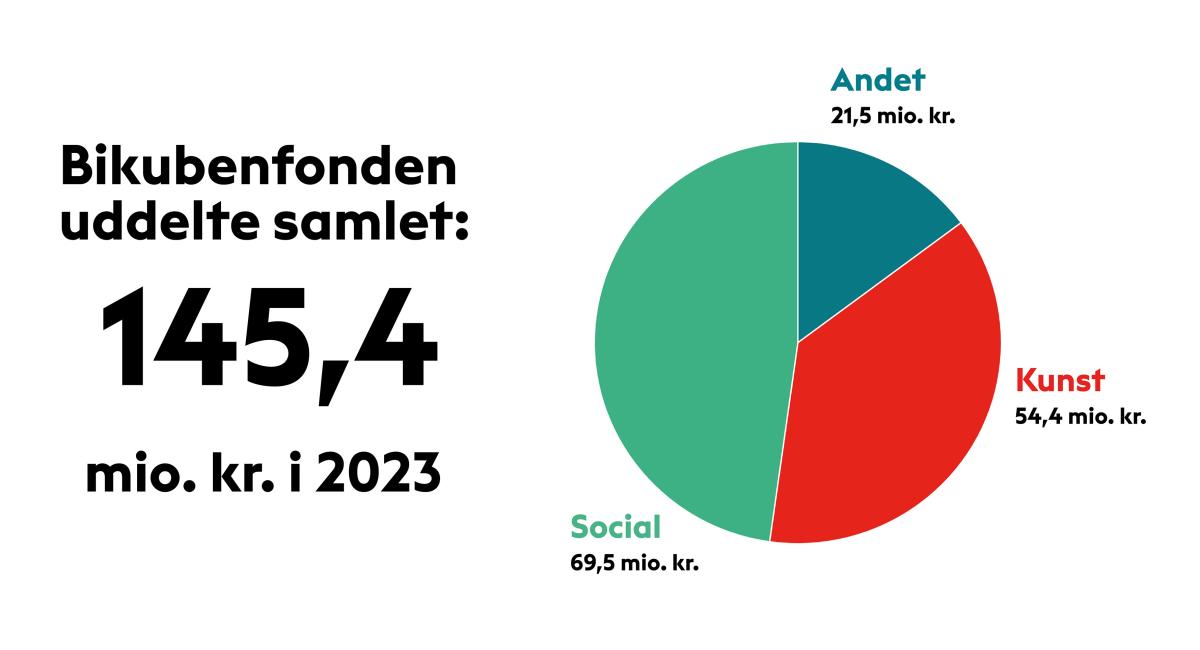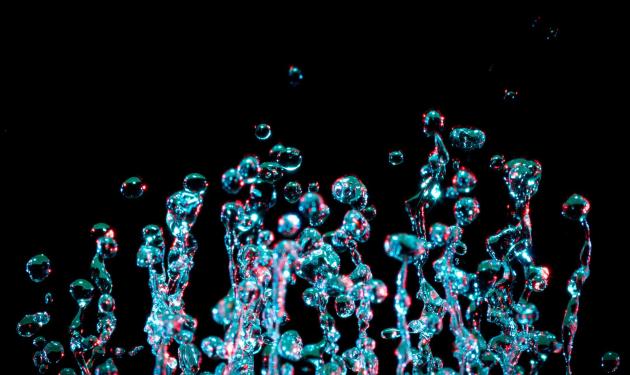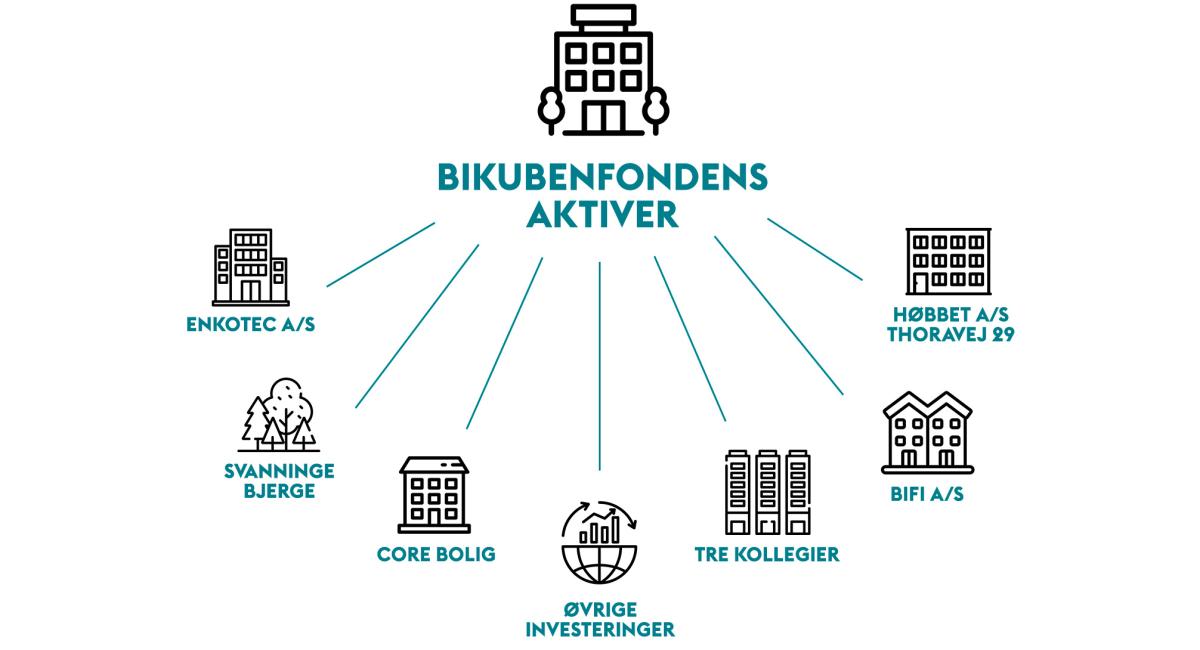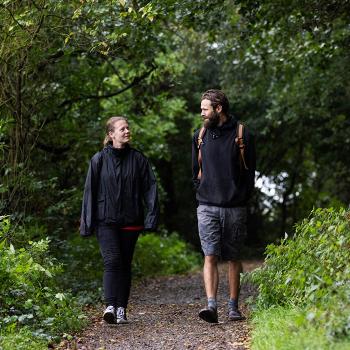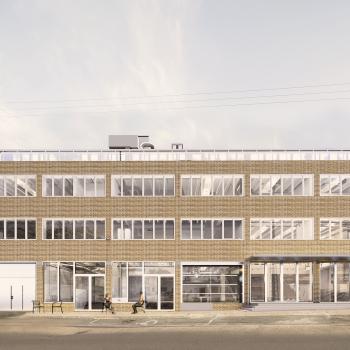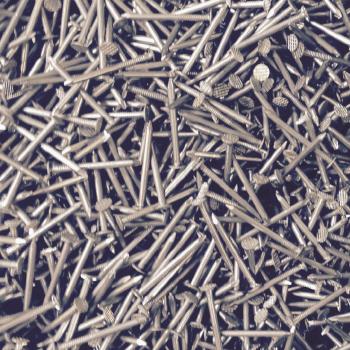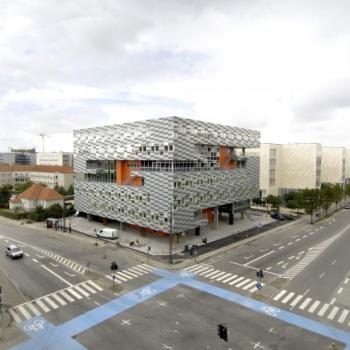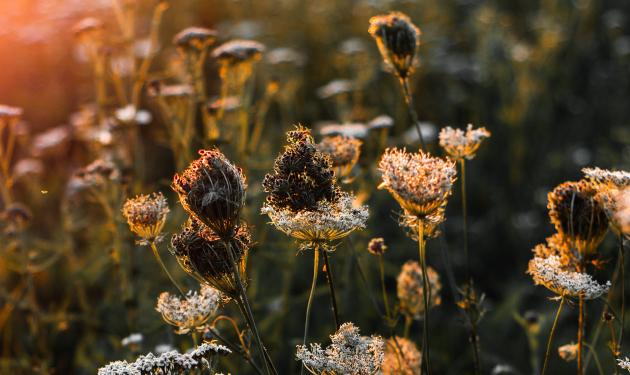ANNUAL REPORT 2023
The Bikuben Foundation has its historical roots in the savings bank movement. The independent institution Sparekassen Bikuben was established in 1857 in response to a need for increased welfare for the growing working class in Copenhagen. Our assets originally stem from Sparekassen Bikuben's transition to Sparekasse Aktieselskab in 1989. Today, we invest broadly in companies, equities and bonds as well as credit bonds to generate returns that can be used for the foundation's charitable purposes.
At the Bikuben Foundation, we continue to work based on the savings bank's core values of community involvement, innovation and self-help. Our purpose is threefold:
- We engage in financial activities through investments in shares or other equity investments and convertible bonds in commercial enterprises of all kinds.
- We provide grants, loans or otherwise promote the operation of Danish craft businesses and small industrial companies.
- We act in favour of non-profit and charitable purposes at the discretion of the Board of Directors.
The four values that guide our work are to be collaborative, innovative, risk-taking and long-term. Based on these values, we strive to always be transparent, facilitative, attitude-based and value-creating.
In recent years, we have transformed from an applicant-driven foundation that supported individual projects to a foundation that acts as a catalyst for systemic change by mobilising people and organisations across sectors, disciplines and positions of power. We work to create new opportunities for young people on the margins of society and for contemporary performing and visual arts through various philanthropic means, such as alliances and partnerships, development programmes, physical facilities and new knowledge.
Read more about our work here.
In 2023, we allocated a total of DKK 145.4 million to the foundation's strategic focus areas. The money was divided into DKK 54.4 million for contemporary performing and visual arts, DKK 69.5 million for young people on the edge and DKK 21.5 million for other purposes. Of this, there was a reversal of DKK 8 million, resulting in a net distribution of DKK 137.4 million.
The year's grants totalled DKK 145.4 million. At the end of 2023, a framework of DKK 225 million was earmarked for later, as in 2022. The grants are divided between social, art and other purposes. In 2023, we allocated DKK 54.4 million to the arts, DKK 69.5 million to the social sector and DKK 21.5 million to other purposes, which covers the foundation's long-term investments in Kronprinsparrets Priser and Thoravej 29. Of this, there has been a reversal of DKK 8 million, resulting in a net distribution of DKK 137.4 million.
See the complete overview of our grants in 2023 here.
At the Bikuben Foundation, we believe that systemic change is needed to solve some of the complex issues facing our society. And if art is to be given space and contribute to development and innovation. Our approach to creating change is to gather new knowledge about society's complex issues and join forces with others to rethink the systems our society is built on.
We insist on trying new ways rather than repeating existing practices. As development partners, we collaborate with a range of organisations, institutions, NGOs and municipalities and fund experimental approaches in both the arts and social sectors.
CURRENT PERFORMING AND VISUAL ARTS
In the field of art, we work from a strong belief in the importance of art. That's why we support the inventiveness and quality of the art scene. We want to create space for innovation, experimentation, learning and sharing, thereby contributing to artistic development and strengthening the role of art in our society.
The overarching focus of our work in the arts in 2023 has been our strategic focus on systemic change to strengthen the impact of art on people and society in the future.
Case: New knowledge about the importance of art in public spaces can strengthen the fulfilment of art
People's encounters with art are important for both the individual and society. With new methods, knowledge and partnerships, we promote public dialogue about the importance of art. We want to contribute to improving the framework and conditions for art to flourish.
Several visual and performing arts institutions are experimenting with breaking with the physical framework and making art accessible in the spaces where people live and are; the public space. To support and create a better framework for this ambition, at the end of 2023 we entered into a new collaboration with the Danish Institute for Cultural Analyses on the initiative The Importance of Art in Public Spaces.
Our shared ambition is to contribute new knowledge that can inspire changes to political frameworks and structures, enabling art institutions and their partners to create new and more art encounters for citizens in public spaces.
New initiative will strengthen knowledge about art meetings and help improve framework conditions
We see great potential in supporting art institutions, municipalities and other stakeholders in the development of new art encounters. The potential lies in making art present and accessible to more people and a diverse audience. But we also see some barriers in, for example, framework conditions: For example, art institutions are measured by the number of visitors within their own physical space - while the audience that experiences the institution's art in a public space or digitally is often not counted. Such framework conditions can limit the development and ambitions of art institutions to create good art encounters with citizens.
As part of the initiative The Importance of Art in Public Spaces, we will work with the art field's stakeholders to recreate the art encounter so that more and more different people in our society encounter art.
Focus on the importance of performing and visual arts since 2020
The starting point for this initiative is our work on the importance of the arts, where we have supported the development of municipalities and art institutions since 2020. In 2023, we have worked to increase engagement through dialogue with political committees, administrations and heads of culture, as well as the National Association of Local Authorities' network. We also gathered the arts and culture field for an event with the Minister of Culture at Christiansborg - in a conversation about the importance of art.
With our new initiative The importance of art in the public space, we look forward to continuing to contribute knowledge that can strengthen the conditions for the expression of art in our society.
Read more here.
Case: SMK Fridays can set new standards for the art museum experience
SMK Fridays will be a meeting place for more - and more different - people and help change the idea of what a museum visit can be. As a learning and development engine for the entire SMK - National Gallery of Denmark, they will set new standards for hosting and communities with art at the centre. In 2023, we entered into a 9-year strategic partnership with SMK Fridays to fulfil this ambition.
In our partnership, we have a shared ambition for SMK Fridays to become a national and international resource for rethinking hosting and communities with art at the centre.
New strategic partnership builds on ten years of learning
For 10 years and 58 festive Fridays, we have collaborated with SMK Fridays, which since 2013 has been Copenhagen's social and experimental Friday event, mixing art, talks, music and drinks for a different museum experience in the evening hours at SMK.
The new partnership builds on what SMK has learnt: it is possible to create a new framework for who a museum visitor is, but it requires a long and persistent effort. Time and space is needed to experiment and test, because the format must be constantly rethought in relevant and current directions that make sense to museum visitors, so that even more - and more diverse - people can participate.
SMK Fridays will contribute to new ways of being an art institution
Over the next nine years of strategic development, SMK Fridays' experimental space and organisational learning engine can contribute to completely new ideas about what it means to be a museum.
At the same time, it is our ambition that the experiences from the partnership can inspire players in the art field both in Denmark and abroad and contribute to the way we develop the art institutions of the future, so that art can play a greater role in creating the society of the future.
Read more here.
YOUNG PEOPLE ON THE EDGE
In the social sector, we work to create new opportunities for young people on the edge between the ages of 13-30 so they can master their own lives. We do this through three missions: 1) To end youth homelessness, 2) To ensure that young people in care are supported in the transition between placement and adulthood, and 3) To ensure that no young person is excluded from jobs, education and strong communities.
We work to generate new knowledge, test new solutions, set agendas and mobilise actors across disciplines and sectors - and always with young people at the centre. Because we believe that this is how we can create the changes needed to create new opportunities for young people on the margins of society.
Case: Youth empowerment in policy and practice development
When we create new opportunities for marginalised young people, it is crucial that young people themselves and their lived experiences are a central part of the development work. Otherwise, we will not succeed in developing national policies and local initiatives that can actually move young people in a positive direction. In 2023, the voices of young people in the 'En Vej til Alle' coalition helped inspire the work of the Reform Commission.
It is crucial that collaboration with young people is continuous in all phases of ambitious change initiatives. It's about making young people co-creators of new solutions and using their stories to provide unique insights into challenges and unrealised potentials.
En Vej til Alle highlights solutions for and with young people
42,000 young people are on the edge of society without a job or education. This has been the case for decades despite numerous reforms, and it has major consequences for both the individual young person and society. In the Change Coalition En Vej til Alle, we have joined forces with a wide range of organisations with the common goal of creating new paths to jobs, education and communities for all young people. In 2021, we initiated and funded the coalition because we believe that to create lasting change for the benefit of young people, we need to join forces across organisations and interests. First and foremost, the coalition wants to be an active player in creating social change - especially when traditional political solutions fall short. At the same time, we launch experiments and highlight the good solutions that already work in practice.
Youth and student organisations and young people with experience of the issue are a central and fundamental part of all activities in En Vej til Alle. This is crucial if we are to create meaningful change for young people. In the coalition, young people have helped to identify where there is particular potential for change. In 2023, the coalition hosted the Youth Summit, where 120 young people and the coalition's organisations came together to discuss how to create the necessary change with and for young people. Four young hosts led participants through a day full of youth stories, debates and workshops.
Read more about En Vej til Alle here.
En Vej til Alle bridged the gap between the Reform Commission and young people
Youth involvement has also resonated with the Reform Commission, which was set up by the government to propose reforms that address complex challenges. In its report 'Nye Reformveje' (New Pathways to Reform), the Commission emphasises that youth involvement is crucial if vulnerable young people are to be helped in a better way in the future. At the Youth Summit, Commission Chair Nina Smith emphasised that young people's input has been invaluable to the Commission's work.
New five-year partnership with Modstrøm
At the Bikuben Foundation, we work to ensure that young people are more involved in policy development and in the development of municipal practice. One way we do this is through our ten-year partnership with De Anbragtes Vilkår. For example, they work to bring young people's voices into legislative work and have also established the concept 'DAV investigates', where former care recipients contribute to practice development locally, based on, for example, municipalities and residential centres' own young people. In 2023, we strengthened our focus on youth voices with a partnership with Modstrøm.
Together with Egmontfonden, Lauritzenfonden and Tuborgfondet, we entered into a strategic partnership with Modstrøm. Modstrøm works on the philosophy that all too often we talk about young people in vulnerable positions and not with them. Modstrøm has been at the forefront of En Vej til Alle and has helped mobilise around a common ambition, direction and action.
‘With the partnership, we will lift a strategic shift in Modstrøm. We will work to broaden their target group focus and support Modstrøm in strengthening their position in bringing the voices of young people on the margins right into society-changing initiatives.
Case: More decision-making power for young people on the edge
Today, youth engagement is focussed and relevant in many places, but it's still the system that makes the final decisions on the actions to move young people forward. But what does it take to empower young people? And can it strengthen their path into adulthood? This is the background to the development partnership More decision-making power for young people on the edge.
In 2023, we launched the More decision-making power for young people on the edge programme, which runs from 2024-2026. The programme will test the potential of a new approach to working with young people in municipal programmes: more decision-making power. Several of the professionals we are in dialogue with pointed us in the direction of this approach.
Together with the Copenhagen Kommune, Roskilde Kommune and Ballerup Kommune, we will learn more about the opportunities and challenges it creates for young people, professionals and the system when we test several initiatives that give young people the opportunity to make more decisions about their municipal programmes.
Experiments with youth involvement to improve quality and social field knowledge
With this programme, we want to focus on increased decision-making power as an approach to working with young people on the edge. The approach has shown potential on a small scale, but there are still many unanswered questions about how to work with it in practice and where the boundaries for applying the approach lie.
The three municipalities in the programme have different experiences of involving citizens, and they are all curious about how the new partnership can show new ways of working with vulnerable young people. In the development partnership, the municipalities will build on these experiences.
The development partnership will also invite young people, organisations, decision-makers and others to jointly develop knowledge and ideas about the opportunities and challenges of empowering young people on the edge.
With the development partnership, we hope first and foremost that the experiences we gain can improve the quality of our collaboration with young people in the municipalities. Furthermore, the ambition is that the new insights can contribute to the national debate and improve the social field's overall knowledge of what it takes to help young people on their way.
Read more here.
The Bikuben Foundation’s board of Directors
The Board of Directors consists of eight members who are responsible for the overall management of the foundation based on the principles of good foundation management. In 2023, the Board consisted of Chairman Niels Smedegaard, Vice Chairman Thomas Hofman-Bang and board members Louise Gade, Dorrit Vanglo, Marie Nipper, Mads Roke Clausen, Maria Rørbye Rønn and Sheela Maini Søgaard.
In 2023, Chairman of the Board Niels Smedegaard and Board member Dorrit Vanglo were up for election. They were re-elected for a two-year term expiring in 2025. In addition, Maria Rørbye Rønn and Sheila Maini Søgaard joined the board as new board members due to the development we are facing. There is an upcoming generational change in the board and major changes in the coming years, including Thoravej 29. This requires profiles with great insight into society, strong leadership skills and experience with, among other things, the transformation of organisations. Maria Rørbye Rønn and Sheila Maini Søgaard are up for election in 2025.
Board members are elected by the Board of Directors by simple majority for two years at a time. Members of the board can be re-elected five times and thus serve on the board for up to 12 years. Members elect their own chairman and can elect a vice-chairman. Board members must retire from the board no later than 1 May in the year they turn 70.
The selection of new board members is based on a thorough recruitment process with independent external assistance.The process is based on the board having the necessary competences within management, investment, business operations, art and social issues.
Board members receive a fixed basic fee of DKK 200,000 per year for ongoing board work.The chairman receives three times the basic fee and the vice chairman twice the basic fee.No board members receive additional remuneration from the Bikuben Foundation.
In 2023, the board held six board meetings, including a strategy seminar. The chairmanship held preliminary meetings with the Executive Board prior to all board meetings.
The Bikuben Foundation's Executive Board
Until 27 February 2023, the Bikuben Foundation's Executive Board consisted of CEO Søren Kaare-Andersen, CEO Mette Marcus and CEO Sine Egede Eskesen. After 10 years with the Bikuben Foundation, CEO Mette Marcus decided to seek new paths. This was the basis for an organisational change, after which Søren Kaare-Andersen remains CEO and Sine Egede Eskesen took up the position of Development Director with a focus on developing the foundation's philanthropic strategies, methods and competencies across the foundation's philanthropic areas.
Søren Kaare-Andersen received an annual salary of DKK 2,783,194 including pension and Sine Egede Eskesen received an annual salary of DKK 1,403,840 including pension.
The Bikuben Foundation's secretariat and knowledge resources
In 2023, the Bikuben Foundation had 35 full-time employees. In addition, student assistants and interns were employed. Our employees possess knowledge and professional competences in the arts and social fields, as well as biologists in Svanninge Bjerge. We also have professional competences within innovation, management, public affairs and communication that work with our philanthropic focus areas.
According to section 60 of the Danish Commercial Foundations Act, the Bikuben Foundation's Board of Directors must consider the recommendations of the Committee for Good Foundation Governance. We strongly emphasise that the Bikuben Foundation complies with the principles of good foundation governance. Our board has reviewed and considered each recommendation. The Bikuben Foundation follows all recommendations. The statutory report on good foundation governance is available on our website here.
The Bikuben Foundation owns a number of assets and subsidiaries that we operate with different objectives in mind: assets for investment purposes and assets for foundation purposes. The following describes the assets where there has been significant activity to report in 2023.
Significant activities in 2023
Svanninge Bjerge – Nature-integrated social work and biodiversity
Svanninge Bjerge is a nature area of approximately 500 hectares in South Funen that we own and operate. In Svanninge Bjerge, we run the Natur til et godt liv - laboratoriet / Nature for a good life - laboratory, which is our nature social programme. Our goal is to give all young people between the ages of 13 and 30 the opportunity to be empowered in nature. Many young people today struggle with mental unhappiness. They can strengthen their life mastery and well-being in nature together with committed professionals such as pedagogues, social workers and therapists. Our work with young people on the edge in nature since 2014 and related research has shown us this. Together, we bring nature into social work and therapeutic practice because we believe that the spaces and phenomena of nature can pave the way for the changes needed to create new opportunities for marginalised young people.
Natur til et godt liv / Nature for a good life - together with partner municipalities and NGOs, the lab has developed the nature-integrated social work approach. We see that the method helps young people to recognise and communicate their emotions, teaches them to take better care of themselves and helps them to strengthen their social relationships.
After almost 10 years of building knowledge in the field of nature-integrated work, we are now in a place where the method is so proven and the experiences so good that in 2023 we stepped up the dissemination of the Natur til et godt liv / Nature for a good life - laboratory. We did this through communication efforts and the development of a magazine and a website where we share the methods behind the work in order to give professionals the opportunity to start integrating nature into their work.
In 2023, we have hosted more than 400 young people and professionals in our nature and organised training days, seminars and workshops with a total of around 250 participants.
In 2024, we publish a study on the basic principles of nature-integrated social work. The study is designed as principles rather than a manual to make it easier to integrate nature into an existing social practice. In addition, we will continue to work on mobilising the field through communication efforts and together with our partners.
Read about the Natur til et godt liv / Nature for a good life - laboratory here.
Since we acquired Svanninge Bjerge in 2005, we have worked with many different initiatives to create the best conditions for diverse plant and animal life. In 2007, for example, inner pastures were established where Welsh Black cattle began to graze. In 2012, we started restoring around 50 drained wetlands and in 2021, grazing Dülmener horses were added. In 2023, we began converting the last areas of production in Svanninge Bjerge, namely the areas with ornamental greenery. The phasing out of ornamental greenery is expected to be completed in 2025. Since 2020, we have collaborated on the development of biodiversity in Svanninge Bjerge with HedeDanmark, which acts as a nature management contractor.
In 2023, the area achieved the most comprehensive FSC ecosystem service certification for biodiversity in Denmark. The ecosystem service certification is a seal of approval and quality assurance of the work to improve and increase biodiversity. We hope that with the certification we can serve as a role model and help give more private forest and landowners the courage to start creating a better framework for biodiversity.
In 2024, the measures planned in connection with the ecosystem service certification will be realised and we will continue to work on further measures to promote biodiversity in Svanninge Bjerge.
Read more about Svanninge Bjerge here.
Thoravej 29
The ambition with Thoravej 29 is to create a meeting place and a professional community for those who can and want to transform people and society. With the building, we will offer a physical setting that is designed to develop, inspire and invite collaboration. In 2023, the transformation of the building began in earnest: Concrete decks from floor separations have been reused as stairs, and the black box for performing arts development is in place at the eastern end of the building.
In the future, Thoravej 29 will house meeting rooms, a black box for performing arts development, studios, workshops, exhibition spaces, a video and sound studio, a café and an open stage for debates and similar events.
The entire remodelling is based on the principle that the building should reuse itself. The project was carried out in collaboration with Pihlmann Architects, the construction company Hoffmann A/S and ABC - Consulting Engineers.
Until the building is completed in 2025, the community is located at Lygten 39 in Nordvest. In 2023, we have been exploring the framework for the community, which has grown to a community of 150 members from 27 organisations during the year.
Read about Thoravej 29 here.
Enkotec A/S
In 2006, we acquired Enkotec A/S as part of our investment portfolio. Since then, dividends from the company have been donated to our philanthropic work.
Enkotec A/S is the world's leading supplier of machines for the production of precision nails. For more than 40 years, Enkotec A/S has developed and refined machines that can mass produce precision nails for the construction industry. The company is headquartered in Skanderborg, Denmark. ‘Since taking over ownership, we have maintained that production should remain in Denmark, and we have succeeded in growing the company to quadruple its size. Today, Enkotec A/S has approximately two-thirds of the world market for machines for the production of high-quality nails. In addition to its headquarters in Skanderborg, the company has its own office in the USA and three agent offices that are spread globally and cover the world market. There are more than 850 of the company's nail production machines in over 50 countries around the world.
Enkotec A/S entered 2023 with a large order backlog, which was produced and delivered to customers. Sales in 2023 decreased 3.4% and the number of employees was adjusted to the activity. At the end of 2023, 74 people were employed in Denmark compared to 78 the year before.
Read about Enkotec here.
Colleges
With Bikuben Kollegierne, we want to provide good and modern living conditions for students so that they can succeed in getting an education. Today, there are Bikuben Kollegiums of high architectural quality in Aalborg, Odense and Copenhagen. We emphasise social sustainability and rent out 10 percent of the rooms in our halls of residence in Ørestaden and Odense to young formerly homeless people. We also focus on running the halls of residence sustainably and choose solutions that are energy efficient and have a long lifespan, such as solar panels.
Our financial strategy is the economic foundation of our philanthropic work. Since 2004, we have had a long-term investment strategy. This is partly because we have realised that this strategy allows us to achieve a relatively higher return than would be possible with a more traditional investment strategy. In addition, the long-term approach helps to ensure a more stable development in our returns, and it works well with our grants, which often extend over several years.
Focusing on sustainability is a natural part of our work in philanthropy. We are conscious of acting appropriately and sustainably in relation to the environment and climate, social conditions and corporate governance. We want to help shape the sustainable development of society by taking the lead when, for example, we run Svanninge Bjerge with biodiversity in mind and when we transform the building at Thoravej 29 with the recycling of building materials as a guiding principle. In our company Enkotec, we focus on producing with the least possible resource consumption, for example in terms of material waste and electricity consumption. For example, we focus on minimising material waste and electricity consumption, environmentally responsible purchasing and ensuring that all suppliers comply with Enkotec's Supplier Code of Conduct, which is in line with the UN Supplier Code of Conduct. We focus on how our investments affect the environment and continuously work to raise the ESG level.
At the same time, we want to work as data-orientated as possible, because data is necessary for us to develop and learn from each other. We see our work with certifications as an important tool, for example, the certification of biodiversity in Svanninge Bjerge in 2023 and with Thoravej 29, where we have been pre-certified for DGNB Gold when the transformation is completed in 2025.
To prepare for future reporting in accordance with the European Corporate Sustainability Reporting Directive (CSRD), in 2023 we conducted a double materiality analysis to assess which environmental, social and governance impacts, risks and opportunities are material to us. This work forms the basis for later measurement on the data points prescribed by the new European Sustainability Reporting Standards (ESRS). In 2024, we will continue to work with measurement on these data points.
Annual ESG analysis of investments
Our investments are based on the UN-supported principles for responsible investment, the UN Global Compact and other international conventions adopted with Denmark's accession. This means, among other things, that when we invest, we take ESG into account and that our investments do not include controversial weapons or tobacco production.
In order to act more responsibly and be transparent about how we act, we have our investment portfolio analysed annually from a sustainability perspective by investment advisor Curo Capital. In the analysis, our managers are measured on their portfolios' impact on climate, people and society. We use the analysis as a basis for an internal strategic discussion on how sustainability should be reflected in the portfolio in the future and what actions should be taken to achieve this.
Based on the analysis, we engage in dialogue with our asset managers to influence their investment processes towards a better ESG process in their underlying investments. The level of what can be considered good ESG performance is not absolute, but in constant flux. With our investments and the resulting influence, we want to help raise the bar and contribute to asset managers continuously raising their ESG requirements.
In our liquid investments, we see a potential for increasing the ESG level, especially in relation to investments in emerging markets. In our illiquid investments, our managers are generally well placed in relation to the benchmark, with the exception of a few underlying companies. We point these out in our dialogue with the managers.
Read the sustainability analyses of our investment portfolio here.
In 2024, when selecting new investments, we will continue to engage in dialogues with our managers about their sustainability strategies and our focus on sustainability reporting. We recognise that in some contexts we are a smaller investor, but we see it as an obligation, especially in our collaboration with US private equity funds, to raise awareness of the importance of sustainability and the ability to report on it.
Annual reports 2018-2023
The full version of the Bikuben Foundation's annual report for 2023 including notes to the financial statements can be downloaded here.
You can also read the annual reports from 2022, 2021, 2020, 2019 and 2018 here.
Read the annual reports for BIFI A/S from 2023, 2022, 2021, 2020, 2019, 2018 and 2017 here.
Read annual reports for Høbbet A/S from 2023, 2022, 2021, 2020, 2019, 2018 and 2017 here.
Read the annual reports for the former Kollegiefonden Bikuben 2018 and 2017 here.
